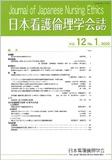Japanese
English
- 販売していません
- Abstract 文献概要
- 参考文献 Reference
- サイト内被引用 Cited by
本研究の目的は、道徳的苦悩の軽減、あるいは道徳的回復力の育成への組織的支援について、看護師長の認識と実態を明らかにすることである。7つの先行文献から22の質問項目を抽出・精選した。属性、組織的支援に関する22の質問、福井らによる組織風土尺度で構成した調査票は、全国200床以上の病院に勤務する看護師長を対象に758部の回答を得た(回収率56.9%)。探索的因子分析では、『看護師長の倫理的姿勢と態度』『病棟の倫理的体制』『看護部の倫理的体制』『病院の倫理的体制』の4因子22項目が抽出された。属性との検討で有効な有意差を示したのは、所属する診療科と組織風土分類のみであった。ただし「実施頻度」と組織風土分類については、全因子との関連でイキイキ型が有意に高いスコアを示した。本研究により、強制的・命令的な雰囲気が少なく、合理的な組織管理ができている職場風土では、看護師の道徳的回復力を育成できる可能性が示唆された。
This study examines organizational support for ethics from the perspective of nurse managers in Japan and explores ways to cultivate moral resilience. A questionnaire survey of nurse managers in hospitals with more than 200 beds was conducted. The questionnaire included items on demographic characteristics, importance and frequency of organizational support for ethics, and a 12-item Organizational Climate Scale adopted from Fukui (2004). The final sample included 758 nurse managers (response rate: 56.9%). Exploratory factor analysis extracted four factors of organizational support for ethics: ethical attitude as a nurse manager, effort in wards, effort as a nursing department, and the hospital's ethics management system. There were no significant differences across the factors regarding the associations of frequency or of importance of ethical support with the respondents' characteristics, including age and length of clinical experience. However, among 4types of organizational climate categorized by the OCS-12, the “Active” group scored higher than other groups on all four factors. The results suggest that nurse managers' ethical attitudes and their organizational support for ethics might be influenced only by the organizational climate. This conclusion implies that less controllable environments and more flexible organizational management might facilitate support of ethical decisions, which, in turn, might cultivate nurses' moral resilience.
Copyright © 2020, The Japan Nursing Ethics Associatin. All rights reserved.


